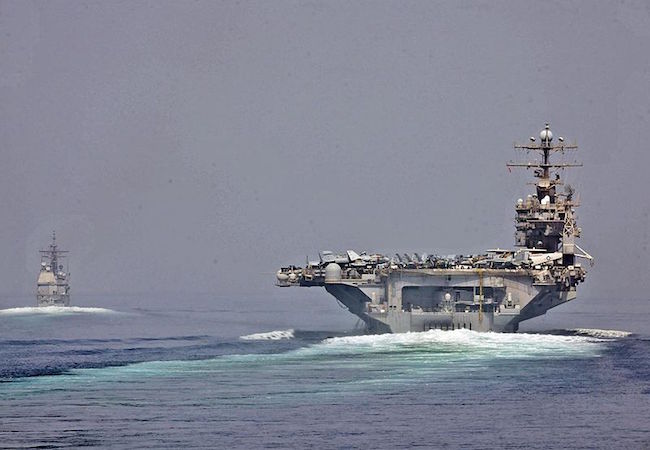Can the United States legally justify an attack against Iran?

The combative action of shooting down an unmanned US reconnaissance drone by Iran has raised reasonable concerns among the international community about the possibility of an impending war between the sparring nations.
For a number of months we have been reading about the hawk-abundant faction of the Trump administration and its willingness, indeed eagerness, to push for retaliatory measures that extend beyond its current policy of severe sanctions against the Iranian economy.
Tensions appeared to come to a virtual head last week, with Iranian hostility in the Strait of Hormuz by attacking two oil tankers (an allegation Iran continues to reject), coupled with their confirmed downing of the US drone.
Vice President Mike Pence has drawn the firmest line in response to Iranian belligerence, warning that any act which leads to the death of a US service member would warrant an immediate military response, although it remains unclear as to what explicitly such a response would entail. Adding further threatening rhetoric to the situation, Secretary of State Mike Pompeo stated that the United States is “considering a full range of options” in response. Again, it is unclear exactly what is being considered, but the cyber-attack launched against Iranian rockets and missiles may have provided us a glimpse.
As tensions continue to escalate, retaliatory measures are considered (commensurate or otherwise), and calls for a tempering of antagonism ensue, it is vital to consider under what circumstances an American attack on Iran should it occur would be legally justifiable under the rules, norms, and standards of international law.
Putting aside its own complicated domestic deliberations, there are only two avenues under international law that the United States can viably seek to legally pursue should it decide to attack what it refers to as ‘the world’s leading state sponsor of terrorism’.
The first bears little consideration. Under Chapter VII, Article 42 of the Charter of the United Nations, the Security Council can authorise the use of force “to maintain or restore international peace and security if it considers non-military measures to be or to have proven inadequate”. Given how divided members of the Security Council are over how to handle the question of Iran’s nuclear ambitions, the central tenant of hostilities that was heightened by the unilateral withdrawal of the US from the Joint Comprehensive Plan of Action, authorisation of collective military action under Article 42 would appear unlikely.
The second legal footing for launching an attack against a nation under international law is by claiming self-defence. Referencing Article 51 of the UN charter, a country is permitted to use force “in the event of an “armed attack” against a Member of the United Nations”.
This second option is a more intriguing one, not only within the context of the current situation, but because the legal argument of self-defence has been utilised by the United States in recent memory as justification to invade Iraq in 2003.
Following the horrors of 9/11, a preventive approach to national security was adopted by the wounded nation that had suffered an attack on its homeland beyond comprehension. As opposed to a reactive strategy, the Bush administration concluded in its grief that a proactive process was necessary to prevent attacks from materialising before they could be realised, and that it was the logical, though somewhat ambiguous, response to such a cataclysmic event.
The outcome of this response manifested itself via the rationale of ‘pre-emptive self-defence’, a somewhat vague concept that centres on the premise of preventing an unspecified attack or ‘imminent threat’ in an undefined future period. While the UN Charter does account for the “inherent right” of states to act in self-defence (“Nothing in the present Charter shall impair the inherent right of individual or collective self-defence if an armed attack occurs against a Member of the United Nations”), the type of reactive self-defence that is accounted for in the Charter reads markedly differently from the ambiguous notion of ‘pre-emptive’ self-defence employed by the United States in the height of its national security apprehension.
Although the Iranians have claimed responsibility for shooting down the US drone (whether it was flying in international or over Iranian airspace is still contested as of writing), can the US viably argue that such an action constitutes an imminent threat to its national security, and therefore justify the same pre-emptive self-defence as was utilised in the early years of the twenty-first century?
The answer is: probably not.
The view of the International Court of Justice (ICJ) as expressed in the case of The Republic of Nicaragua v. The United States of America, is that armed attacks against a nation include only “the most grave forms of the use of force”. Rationalising a grave use of force by the Iranians in this instance which would be difficult to suggest given that no loss of life was incurred by downing the drone, however regrettable the incident may have been.
Unless Iran undertakes some action that leads to the death, advertently or inadvertently, of a US service member, the case for a legally justifiable attack against the Islamic Republic would be internationally condemned and extremely tenuous to justify based on present circumstances.
Yet with John Bolton at the helm of national security, the Trump administration will continue to weigh up all options as the United States and Iran maintain their long-standing animosity towards one another, as will a volatile Iran whose economy has been crippled as the result of Western sanctions. If events continue along a path analogous to what we have been observing over past week, the likelihood of a trigger-happy incident occurring that sparks a wider conflict unfortunately increases, at which point the legal considerations and cautions of the international community may be thrown to the wind.







